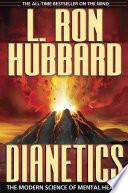Quotes from work
Dianetics

Dianetics is a set of ideas and practices regarding the metaphysical relationship between the mind and body created by science fiction writer L. Ron Hubbard. Dianetics is practiced by followers of Scientology and the Nation of Islam .Dianetics divides the mind into three parts: the conscious "analytical mind", the subconscious "reactive mind", and the somatic mind. The goal of Dianetics is to erase the content of the "reactive mind", which practitioners believe interferes with a person's ethics, awareness, happiness, and sanity. The Dianetics procedure to achieve this erasure is called "auditing". In auditing, the Dianetic auditor asks a series of questions which are intended to help a person locate and deal with painful past experiences.Practitioners of Dianetics believe that "the basic principle of existence is to survive" and that the basic personality of humans is sincere, intelligent, and good. The drive for goodness and survival is distorted and inhibited by aberrations. Hubbard proposed this model, and then developed Dianetics with the claim that it could eradicate these aberrations.When Hubbard formulated Dianetics, he described it as "a mix of Western technology and Oriental philosophy". Hubbard claimed that Dianetics could increase intelligence, eliminate unwanted emotions and alleviate a wide range of illnesses he believed to be psychosomatic. Among the conditions purportedly treated were arthritis, allergies, asthma, some coronary difficulties, eye trouble, ulcers, migraine headaches, "sexual deviation" , and even death.Hubbard initially described Dianetics as a branch of psychology. Jon Atack writes that the original Dianetic techniques can be derived almost entirely from Sigmund Freud's lectures. Hubbard created the "Freudian Foundation of America" and offered graduate auditors certificates which included that of "Freudian Psychoanalyst." Hubbard was influenced in creating Dianetics by many psychologists such as William Sargant's work on abreaction therapy, Carl Jung, Roy Grinker and John Spiegel's writing on hypnosis and hypnoanalysis, Nandor Fodor, Otto Rank, and others. Alfred Korzybski's general semantics was also cited by Hubbard as an influence.Hubbard differentiated Dianetics from Scientology, saying that Dianetics was a mental therapy science and Scientology was a religion. Dianetics predates Hubbard's classification of Scientology as an "applied religious philosophy". Early in 1951, he expanded his writings to include teachings related to the soul, or "thetan".